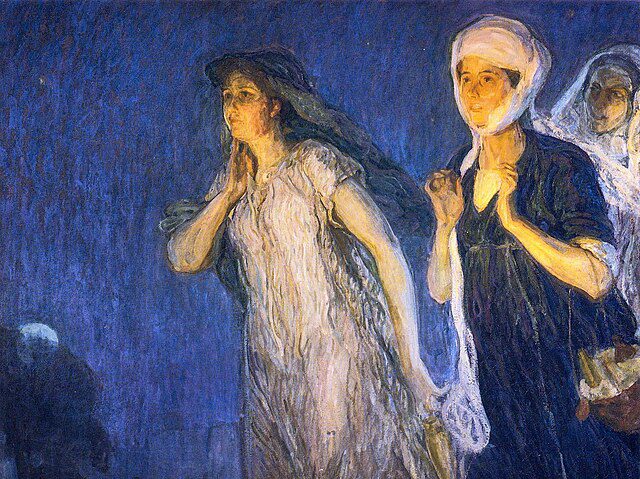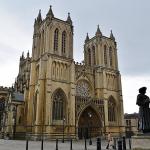
Henry Ossawa Tanner
1910
The 25th of April is celebrated as the feast of the Evangelist Mark, also called St Mark, and John Mark. He is the tradition founder of the see of Alexandria, one of the five central churches of the early Christian communion.
Which, of course, makes me think of the Gospel of Mark.
When Pier Paolo Pasolini made his 1964 masterwork, the Gospel According to Matthew, he chose that gospel as the basis because “John was too mystical, Mark too vulgar, and Luke too sentimental.” Perhaps following different rules the church has largely also based its understanding of the “historical” Jesus through Matthew.
However, starting in the nineteenth century those in that quest for understanding the person behind the gospels have increasingly believed the earliest of the surviving stories of Jesus is contained in Mark. There are various reasons for this. The gospel almost certainly was originally composed in Greek and while several possible locations for it are posited, most seem to think it was written in Rome. It is also assumed the gospel was written somewhere in the neighborhood of the destruction of the temple and the sacking of Jerusalem in the year 70. So, a lifetime after the life and death of Jesus.
The earliest attestation of authorship for the text as Mark, was by Papias of Hierapolis. Somewhere on the cusp of the first and second centuries, so another lifetime later yet, claimed Mark who was a companion of Peter as the author. Pretty much from about then it’s been assumed Mark is the evangelist. It seems the majority of contemporary scholars find that unlikely. Rather, it’s generally assumed the gospel is written by an anonymous hand from various probably largely oral traditions concerning the master and his message.
While few who deeply study the matter consider any of the gospels as meant to be biographies in the sense we would use that word today, they are also the only sources we have for the history of both Jesus and the events of his life and ministry and how it passed from him. So, they’re mined. These days most scholars assume Mark to be a source for both Matthew and Luke. John is an outlier, composed much much later, and not generally considered a source for historical matters.
All interesting stuff. But, the thing that most interests me is the ending of the gospel.
The two oldest extant documents containing the gospel, the Codex Vaticanus and the Codex Sinaitucus both dating to the mid fourth century end with Mary Magdalene, Mary the mother of James, and Salome having found the tomb empty fled.
Mark 16:8
In the King James Version “And they went out quickly, and fled from the sepulchre; for they trembled and were amazed: neither said they any thing to any man; for they were afraid.” In the New Revised Standard Version, which is the most common main-stream Protestand version used in seminaries “So they went out and fled from the tomb, for terror and amazement had seized them, and they said nothing to anyone, for they were afraid.”
Later texts contain two different endings, one called the “shorter” the other the “longer.” I do not believe many from the mainstream of the scholarly community believe either as really belonging to the text as it was written. Later editors just did not like how it ended at 16:8 and fixed it. Most Protestant versions of the Bible include the “longer” version but usually mark it out with brackets.
While I am interested in the person of Jesus, who he might have really been and what might have been what he actually taught, I am also very interested in the mystery religion that we know as normative Christianity. And with that I’m deeply moved by that passage which includes fear and silence.
Fear and silence.
A beloved teacher is brutally killed. He’s buried. The women, and it is always good to note it was women here, not men. They’d come later when they decided to organize things. These women came upon an empty tomb. The most obvious thing would be that people stole the body. Why can be argued, but someone just taking it is, well, what anyone reasonably might assume. But it contains other possibilities, as well.
They lived in a spirit filled world, in some ways much richer than our own. We embrace the spare. I do. What can be measured deserves a certain primacy. But we also tend to get caught up in the fancy of the material and forget the world is a mysterious thing. And for the women other non-human actions certainly could be in play, as well. After all he spoke of mysteries. Why not one more?
And then there’s silence. Why silence? Well, who is to believe them? And who is it that they would tell this to? If it was part of some plot, they could walk into trouble. Perhaps serious trouble. Silence is sometimes the only shield the powerless have.
But silence has other shapes and contexts. And they seem so possible in this story of strange words and miracles.
Pasolini’s “vulgar gospel.” Vulgar is such a rich word. Lacking in taste, obviously. Course. Uncultivated. Crude. It can be embarrassing. And, it means, the people, the ordinary people, the ones who come generation after generation, working and loving and dying. Remembered for a day. And then lost…
It’s almost as if someone wanted to hide the good news in the good news. I don’t really think a conspiracy, but it was more likely a case of just not seeing it.
I think of unfolding miracles. I think of our ordinary lives. I don’t see a lot of difference.
Fear and silence.
Fear of the lord is the beginning of wisdom, someone said.
Silence is golden, said someone else.
A pointer. And an invitation.













